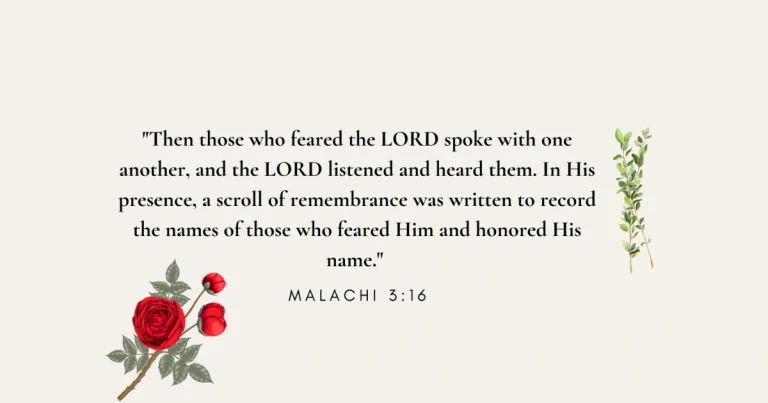“Then those who feared the LORD spoke with one another, and the LORD listened and heard them. In His presence, a scroll of remembrance was written to record the names of those who feared Him and honored His name.” “But for you who fear My name, the Sun of Righteousness will rise with healing in His wings. And you will go free, leaping with joy like calves released from the stall.” Malachi 3:16, 4:2
I’ve always been selective about the conversations I engage in. Not because I don’t enjoy talking, but because I think deeply. I meditate on things long after they’ve been said. The last thing I need is to dwell on words that don’t edify me or leave me wondering, Why did I even have that conversation?
One scripture that shaped this decision early in my life is: Colossians 4:6: “Let your speech be always with grace, seasoned with salt, that ye may know how ye ought to answer every man.” Another is: Philippians 4:8: “Finally, brethren, whatsoever things are true, whatsoever things are honest, whatsoever things are just, whatsoever things are pure, whatsoever things are lovely, whatsoever things are of good report; if there be any virtue, and if there be any praise, think on these things.”
These verses remind me that words are powerful; they shape our thoughts, our emotions, and ultimately, our lives. That’s why I choose to engage in conversations that uplift, inspire, and honor God. I use Philippians 4:8 as the yardstick for my conversations. In just milliseconds, I weigh every conversation I’m about to have against this scripture:
- Is it true?
- Is it honest?
- Is it just?
- Is it pure?
- Is it lovely?
- Is it of good report?
- Does it carry virtue or inspire praise?”
If the answer is no, I don’t just stay silent-I remove myself from that space entirely. I cannot afford to be part of such conversations, whether actively engaging or passively listening. Sometimes, a topic may be true or even honest, but does it align with the rest of the standard? Is it pure? Lovely? Of good report? Does it carry virtue or bring praise? If not, I choose to step away.
Recently, as if the Holy Spirit wanted to reinforce this decision in my heart, I came across Malachi 3:16; where Scripture says that the Lord listened to the conversations among believers. I kid you not, a holy fear came over me. I realized more than ever that whenever I, or any group of believers, or friends, gather to talk, there is always One more Person in our midst-listening, observing, and ultimately deciding whether to bless us or leave us to the desires of our hearts. You know how, as husbands and wives, there’s a tendency to say anything that comes to mind; every observation, every thought, every passing remark? It’s not that I was careless with my words, my husband usually wouldn’t even entertain unedifying conversations; but I began to sense that I could be more intentional, even in my conversations with him and others.
I believe God saw this desire in my heart and gave me the Scripture in Malachi 3:16. Now, I often find myself quickly pausing and reminding myself: God is listening to us. And this simple awareness has helped guide our conversations, making them more edifying and honoring to Him.
In fact, the Holy Spirit began to show me that this wasn’t just about conversations involving people; it also applied to the way we speak about life itself. The words we use when discussing our expectations, our economy, the things that aren’t working, how difficult or expensive life has become; all of it matters. Also, God listens when we speak about Him; when we declare His faithfulness, His kindness, and His good deeds. He hears when we speak in faith about our expectations from Him. Our words aren’t just idle talk; they carry weight in His presence.
Aaron and Miriam
A vivid example that God listens to our conversations is that of Miriam and Aaron in Numbers 12: 1-15. Moses had just married an Ethiopian woman, a Cushite, and this irritated Miriam and Aaron. As they discussed it, their conversation turned spiteful; they questioned whether Moses was the only one through whom God spoke, implying that he was nothing special since God also spoke to them. But Scripture says the Lord heard them; and He was not pleased. Keep in mind, Moses had no idea this conversation was even happening. As a result, Miriam was struck with leprosy, serving as an example to the Israelites and to us that God listens to our conversations. Our words have consequences; they can invite either judgment or blessing. The choice is ours. The Bible tells us in 2 Timothy 3:16-17 “All scripture is given by inspiration of God, and is profitable for doctrine, for reproof, for correction, for instruction in righteousness: That the man of God may be perfect, thoroughly furnished unto all good works.”
The Israelites who Perished in the Wilderness
One of the reasons Scripture records the mistakes of those before us is so that we can learn from them and avoid making the same errors. Take the Israelites, for example. Many of them perished in the wilderness not because God wasn’t able to bring them into the Promised Land, but because of their words and expectations.
Numbers 14:28 shows how their own confessions shaped their outcome: “Say unto them, As truly as I live, saith the LORD, as ye have spoken in mine ears, so will I do to you.” Their constant murmuring and negative expectations about their journey led them to receive exactly what they spoke; they never entered the land flowing with milk and honey.
Proverbs 18:21 says “The tongue can bring death or life; those who love to talk will reap the consequences.”
A Few Questions for You to Consider
- If you were to harvest the fruit of your conversations, would it be something you’d gladly eat?
- Would it nourish you, leave a bitter taste, or even bring life or death?






